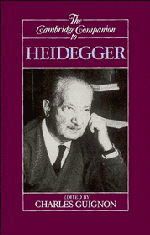Book contents
- Frontmatter
- Introduction
- 1 The question of being
- 2 Reading a life
- 3 The unity of Heidegger's thought
- 4 Intentionality and world
- 5 Time and phenomenology in Husserl and Heidegger
- 6 Heidegger and the hermeneutic turn
- 7 Death, time, history
- 8 Authenticity, moral values, and psychotherapy
- 9 Heidegger, Buddhism, and deep ecology
- 10 Heidegger and theology
- 11 Heidegger on the connection between nihilism, art, technology, and politics
- 12 Engaged agency and background in Heidegger
- 13 Wittgenstein, Heidegger, and the reification of language
- Bibliography
- Index
8 - Authenticity, moral values, and psychotherapy
Published online by Cambridge University Press: 28 May 2006
- Frontmatter
- Introduction
- 1 The question of being
- 2 Reading a life
- 3 The unity of Heidegger's thought
- 4 Intentionality and world
- 5 Time and phenomenology in Husserl and Heidegger
- 6 Heidegger and the hermeneutic turn
- 7 Death, time, history
- 8 Authenticity, moral values, and psychotherapy
- 9 Heidegger, Buddhism, and deep ecology
- 10 Heidegger and theology
- 11 Heidegger on the connection between nihilism, art, technology, and politics
- 12 Engaged agency and background in Heidegger
- 13 Wittgenstein, Heidegger, and the reification of language
- Bibliography
- Index
Summary
PSYCHOTHERAPY AND THE QUESTION OF THE GOOD LIFE
Heidegger's influence on psychotherapy in the English-speaking world has followed a convoluted path. The Swiss physician and therapist Medard Boss tells us that Heidegger expressed the hope that “his thinking would escape the confines of the philosopher's study and become of benefit to wider circles, in particular to a large number of suffering human beings.” His participation in Boss's seminars for medical students and therapists from 1946 on was motivated by this concern. Yet when his writings became more widely known among professionals in the field, it was less through this route than through the impact of existentialism in the fifties and sixties. As a result, though Heidegger's thought is often treated as the cornerstone of existential psychotherapy, what one usually finds is a Heidegger refracted through the lens of the far more accessible writings of Sartre, de Beauvoir, and Camus. In the mouth of this “existentialized” Heidegger, the ideal of authenticity is pictured as the stance of the rugged individualist who, upon experiencing anxiety in the face of the ultimate absurdity of life, lives intensely in the present and creates his or her own world through leaps of radical freedom.
- Type
- Chapter
- Information
- The Cambridge Companion to Heidegger , pp. 215 - 239Publisher: Cambridge University PressPrint publication year: 1993
- 44
- Cited by

